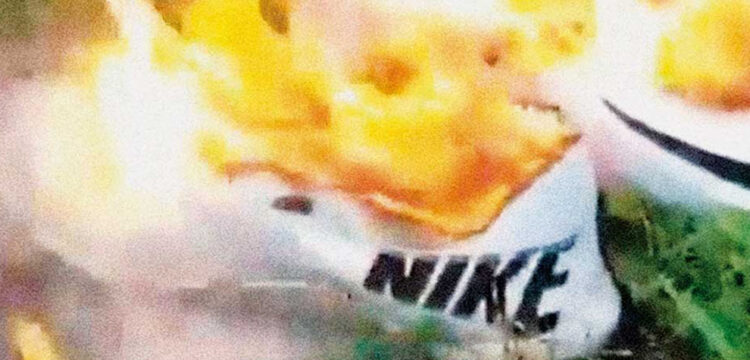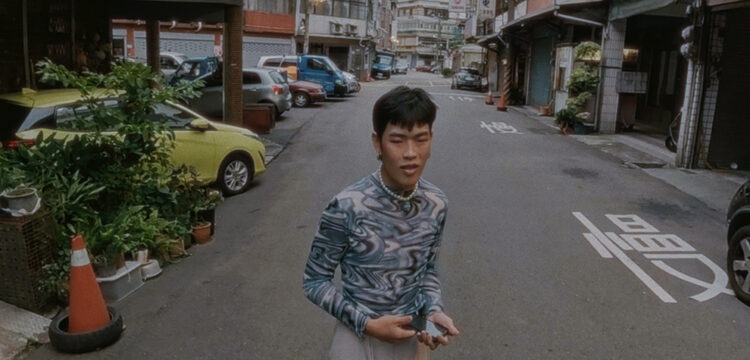REAL
How it feels to be human in the digital age
Everyday digital devices are no longer just tools; they have become gateways to a new multi-layered reality, an exponentially growing augmented universe that we experience largely without a physical connection. As human beings made of flesh, we now spend most of our time in a digital landscape, seeking happiness, wealth, relationships, knowledge, and experiences. What is today’s reality made of?Adele Tulli’s R E A L is a kaleidoscopic and visually striking journey exploring how it feels to be human in the digital age.
The film will be screened on February 12th, at 6:30pm, at Cinema Spazio Scena, Via degli Orti d’Alibert 1, as part of the Spring 2025 edition of the event series Digital Delights & Disturbances (DDD).
The DDD Event Series is organized and sponsored by the JCU Department of Communication and Media Studies, in collaboration with NERO and CRITT (Centro Culture Transnazionali).
More info at [email protected].
How have you come up with the idea for “Real”? What was the urgency behind it?
Adele Tulli: In this project, a series of reflections and thoughts about our condition as digital humans, which I have been thinking about for some time, finally took shape. I was born in 1982, a date that nearly coincides with the widely recognized inception of the internet. Over the course of my life, I have observed and lived the profound transformations wrought by digital technologies, from the advent of personal computers and early video games to the emergence of smartphones, online forums, social networks, and increasingly sophisticated mechanisms of surveillance and control. Then, the relentless expansion of technology’s presence in our daily life reached an unparalleled climax during the COVID-19 pandemic. During the months of lockdown, we experienced the unprecedented and extreme condition of enforced physical isolation. As our bodies remained confined within the walls of our homes, the screens of our devices became thresholds, portals into an exponentially growing augmented digital universe granting us access to life, social interactions, work, relationships… This sudden shift into inhabiting entirely digital landscapes made me realize the extent to which material reality itself was unraveling, giving way to an epochal anthropological rupture, some sort of deep mutation. Therefore the film is an attempt to immerse myself into the disembodied world of the internet and explore how it is transforming us, and how this growing entanglement between human existence and technology is not only reshaping our behaviors but how it is also fundamentally altering our collective idea of “reality”… Ultimately, I felt that whatever we used to call real was collapsing and I started looking for ways to represent this collapse.
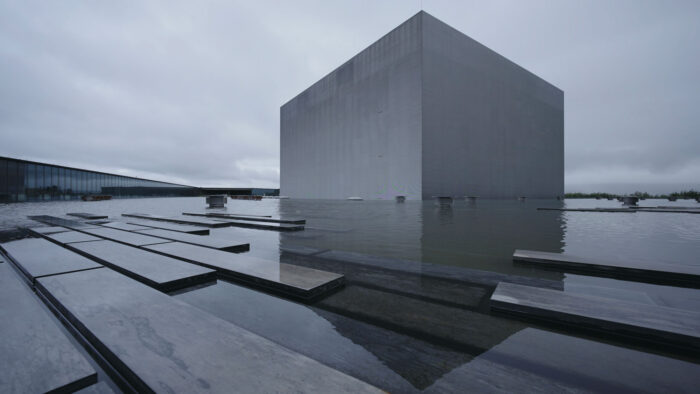
Can you expand a bit on how you intend the wording “real”?
Well, I find it interesting that until not long ago our shared understanding of “reality” used to be made of tangible objects, of corporeal relations, of experiences and events taking place in actual physical spaces. Recently however, an inexorable and very fast process of digital acceleration has profoundly transformed our planet, our societies, and ourselves. Today we largely inhabit a disembodied world, where what we consider “real” is transformed from the physics of oxygen and carbon to the physics of electrons, and the logic of bits.
How real is virtual life though? I think this is one of the central questions that the film attempts to explore, but not to answer. My intention with this film is neither didactic nor explanatory, I do not seek to provide conclusive answers or explanations on such complex, evolving and multi-layered topics, but rather to raise questions, stimulate critical reflections, and interrogate our relationship with the digital world.
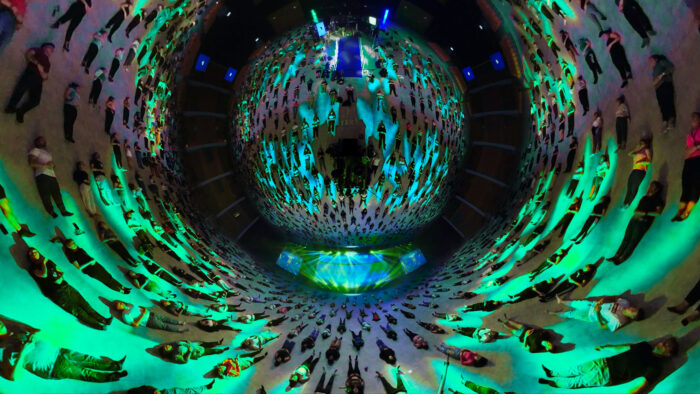
Can we say that the digital worlds, and the relationships that stem from them, are real enough? Or what have you found out while producing the film?
Among the many people I’ve met throughout the research and production of the film, there is a queer VR community of friends who spend most of their time on a platform called VRChat. They were very keen to share their stories, especially about how they envision the metaverse as a digital space of limitless creative expression, where they can explore their identities beyond borders, and beyond any physical barriers. They consider their avatars as manifestations of their perceived selves, which often feel much closer to who they are than their physical bodies. For many of them, avatar embodiment had a huge impact on the story of their self-discovery, and their coming out as trans in VR has impacted their IRL gender identity and expression. Right in the middle of the film, one of them is chatting with a friend and they say “Here I feel so affirmed as a queer person in ways that I haven’t in the physical world, this feels very real to me.”
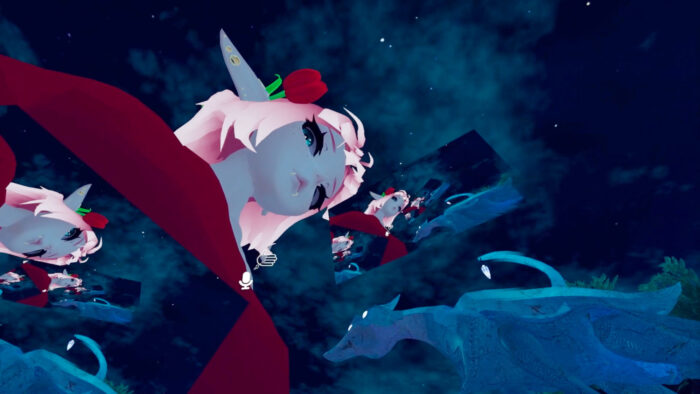
This virtual existence alleviates the frustrations that they often experience in the physical world. There is this aspect of control and agency of your own reality that I find interesting. The physical reality does not correspond to the desired reality, so here people create their own reality, designing for themselves the perfect place, the perfect atmosphere, the perfect physical appearance, the perfect life. There is something both disturbing and liberating about it. But most of all, it makes us think of how oppressive and toxic the physical world has become if people feel the need to escape from it. The aim of the film is not for the viewer to leave with definitive answers, but perhaps to emerge filled with new and unexpected perspectives.
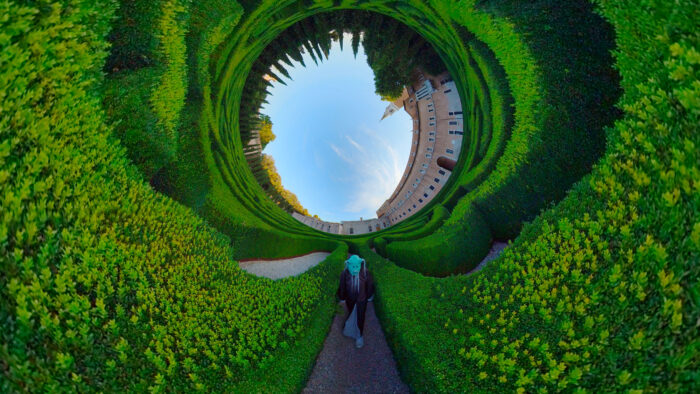
How did you collect the material and edit it?
Before getting into actual film production, I worked on a long research phase during which I figured out some of the main areas of interest I intended to focus on and started looking for people, stories that could illuminate certain aspects of living in a tech-dominated and hyper-connected world. As I began to meet and film people, I also simultaneously started editing them into scenes. Filming and editing often go together in my works, as they do not follow a linear structure, but are composed like an associative mosaic of stories held together not by conventional narrative cohesion, but by the attempt of constructing an open-ended reflection on a subject. Therefore I begin assembling ideas together just as I collect them.
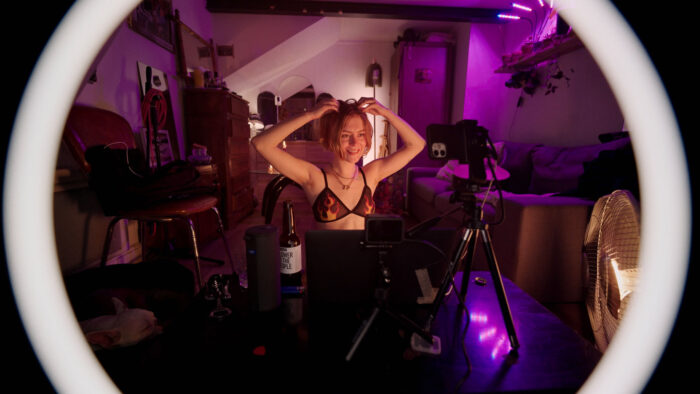
Real is composed of fragments of the daily life of a series of individuals filmed in various parts of the world, spanning both physical and virtual spaces: from a family living in a newly built smart neighborhood in South Korea filled with technological and data-extracting devices, to a VR queer community; the patients of an Internet addiction clinic, dealing with the consequences of their Internet abuse; a live webcam model streaming adult content shows from home; a food delivery rider, whose precarious working conditions prompted him to start his own vlog channel. These scenes are collaged next to images of the material infrastructures that sustain the digital world—such as a colossal data centre or a cable laying vessel—and to fragments of videos fetched from the web: archival internet material simulating the frenetic and sometimes paradoxical and nonsensical feed of social media platforms. The film’s narrative thus proceeds through seemingly unrelated episodes, where the different situations follow one another according to a sort of algorithmic logic, a multiform kaleidoscope where the cohesive element is given by the system that contains them: the Internet, and our present condition of digital humans.
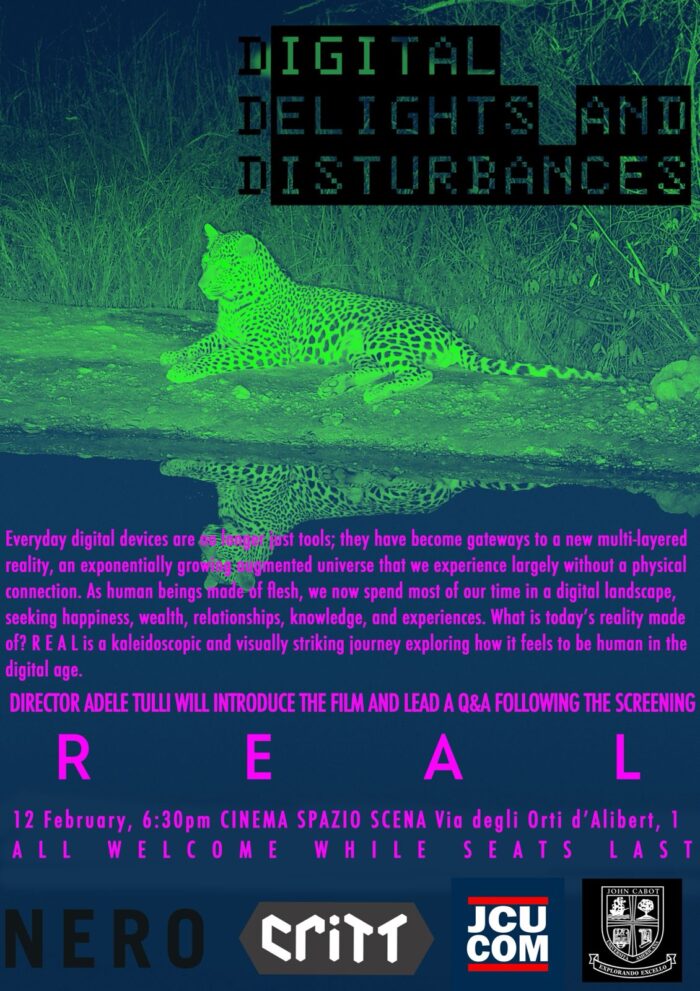
Can we still consider the real and the digital as binaries?
Apart from my general resistance towards any binary categorizations and perspectives, as they tend to oversimplify the complexities of the world, I think that today—when it seems that the average person spends about 7 hours looking at a screen each day for internet-connected activities—we can only talk of the divide between digital and physical realities rather than considering the real and the digital as binaries, or else we would imply that humans seem to spend most of their awake time into an unreal space, which could also be an interesting idea.


